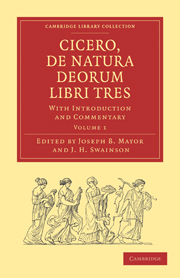INTRODUCTION
Published online by Cambridge University Press: 29 August 2010
Summary
HISTORICAL SKETCH OF GREEK PHILOSOPHY FROM THALES TO CICERO
As Cicero continually refers to the views of earlier philosophers, it seems desirable here to give a short preliminary sketch, which may serve to show their relations to each other, leaving points of detail to be discussed in the notes on each particular passage.
Greek philosophy had its origin not in the mother country, but in the colonies of Asia Minor and Magna Graecia. This is owing partly to the reflectiveness belonging to a more advanced civilization, and partly to the fact that the colonists were brought in contact with the customs and ideas of foreign nations. The philosophers of the earliest, or Pre-Socratic period, are broadly divided into the Ionic and the Italic Schools. Both had the same object of interest, to ascertain the nature, the origin, the laws, the destiny of the visible world. But while the former with the Ionic sensitiveness to all outward influences dwelt more upon the material element itself and the life which manifested itself in its ever-changing developments, the latter (who, if not themselves Dorian, were yet surrounded by Dorian settlers, with their Doric ideal of discipline, order, stability, superiority to sense, as opposed to the Ionic ideal of free growth, of ease, beauty and nature,) turned their thoughts more to the laws by which the world was governed, or the one unchanging substance which they believed to underlie its shifting phenomena.
The first name in Greek philosophy is the so-called founder of the Ionic or physical school, Thales of Miletus, a contemporary of Solon (b.c. 640–550), said to be of Phenician descent.
- Type
- Chapter
- Information
- Cicero, De Natura Deorum Libri TresWith Introduction and Commentary, pp. ix - lxxiiPublisher: Cambridge University PressPrint publication year: 2010First published in: 1880

